人教新目标版英语七年级下Unit 11 How was your school trip?Section A Grammar Focus-3c课件(27张PPT无素材)
文档属性
| 名称 | 人教新目标版英语七年级下Unit 11 How was your school trip?Section A Grammar Focus-3c课件(27张PPT无素材) | 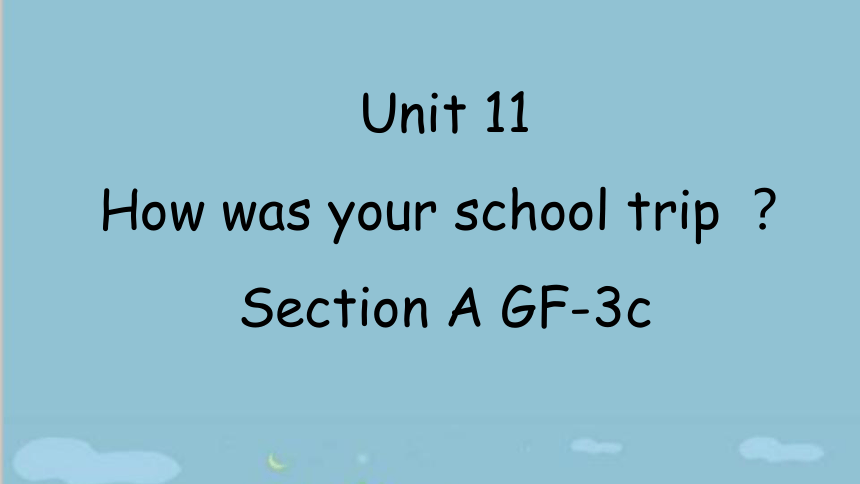 | |
| 格式 | zip | ||
| 文件大小 | 1.3MB | ||
| 资源类型 | 教案 | ||
| 版本资源 | 人教新目标(Go for it)版 | ||
| 科目 | 英语 | ||
| 更新时间 | 2021-06-10 10:30:58 | ||
图片预览

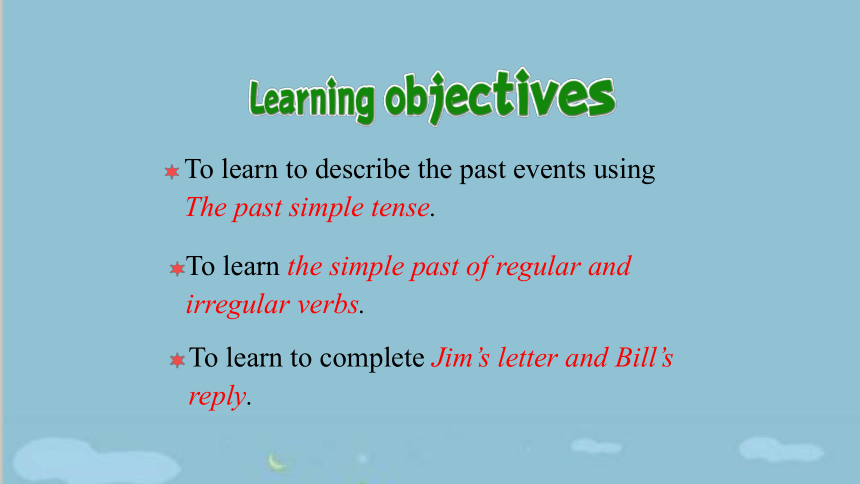
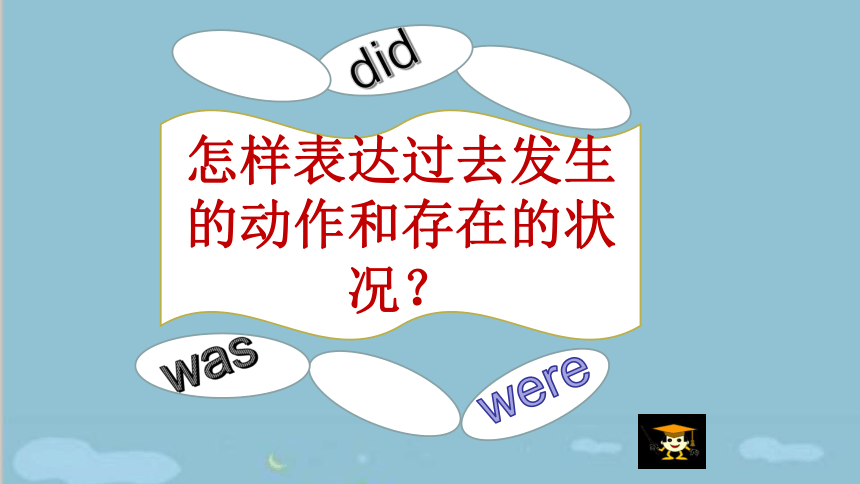
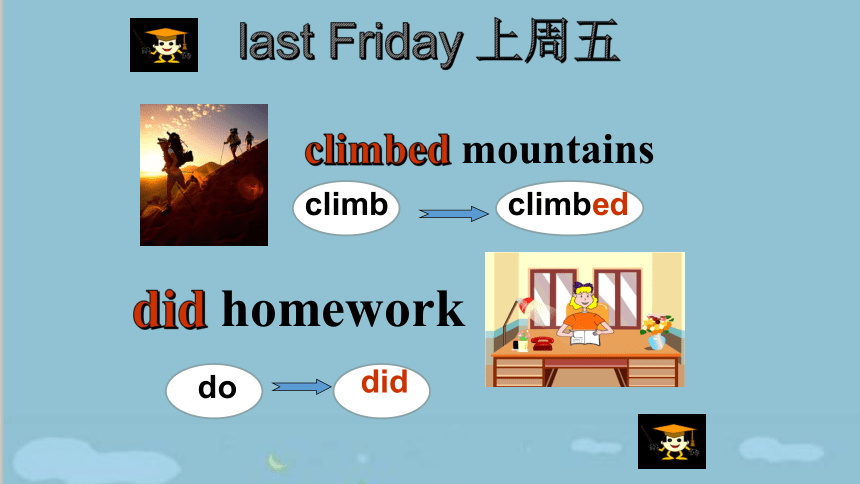

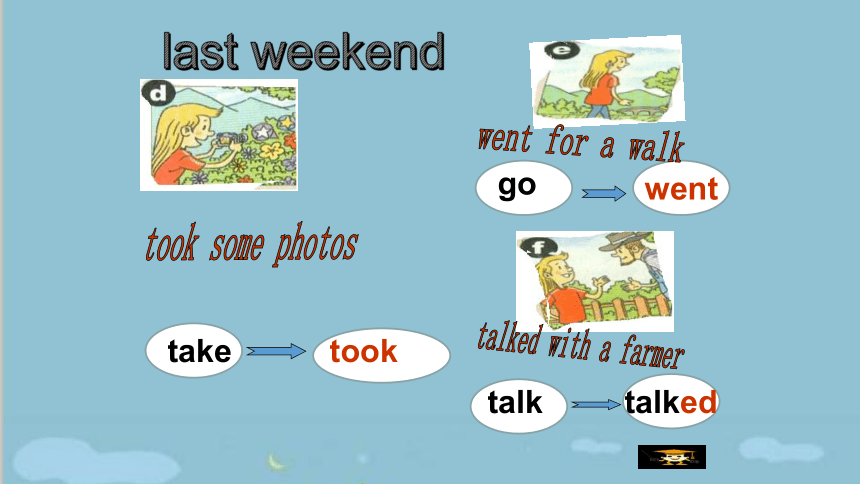
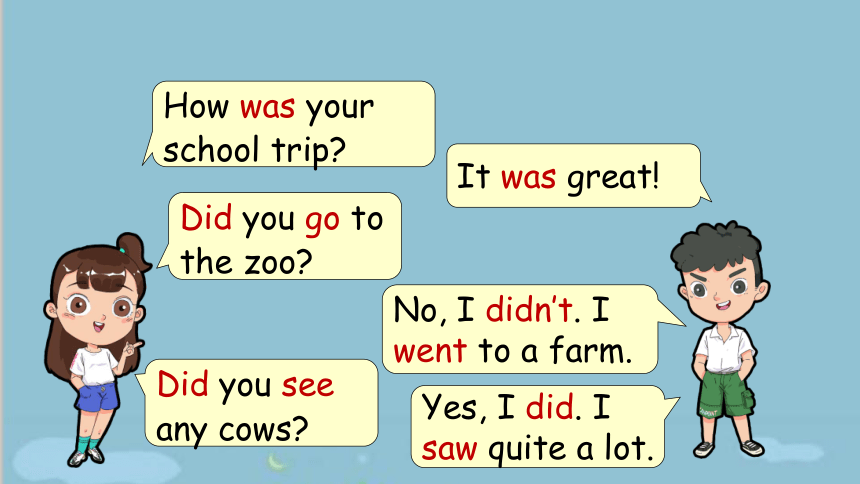
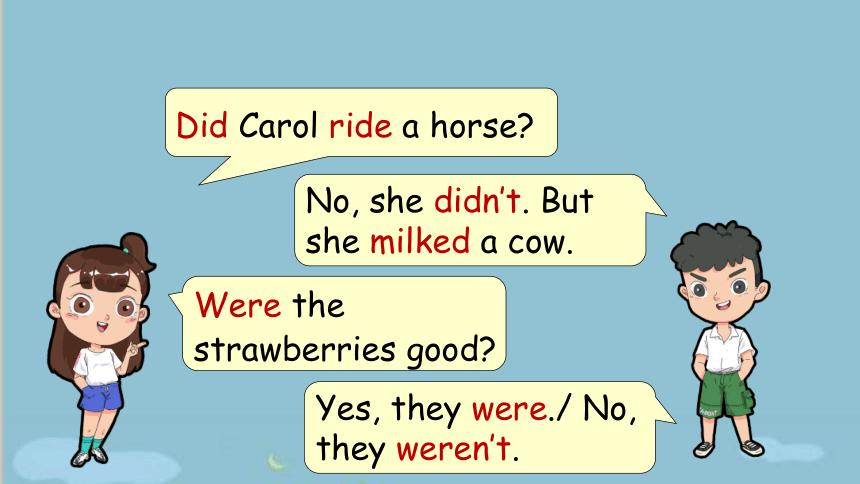

文档简介
(共27张PPT)
Unit
11
How
was
your
school
trip
?
Section
A
GF-3c
To
learn
to
complete
Jim’s
letter
and
Bill’s
reply.
To
learn
to
describe
the
past
events
using
The
past
simple
tense.
To
learn
the
simple
past
of
regular
and
irregular
verbs.
怎样表达过去发生的动作和存在的状况?
was
were
did
climbed
mountains
did
homework
last
Friday
上周五
do
did
climb
climbed
fed
chickens
rode
a
horse
milked
a
cow
last
weekend
milk
milked
ride
rode
feed
fed
[ka?]
[m?lk]
[fi?d]
last
weekend
take
took
go
went
talk
talked
took
some
photos
went
for
a
walk
talked
with
a
farmer
How
was
your
school
trip?
It
was
great!
Did
you
go
to
the
zoo?
No,
I
didn’t.
I
went
to
a
farm.
Did
you
see
any
cows?
Yes,
I
did.
I
saw
quite
a
lot.
Did
Carol
ride
a
horse?
No,
she
didn’t.
But
she
milked
a
cow.
Were
the
strawberries
good?
Yes,
they
were./
No,
they
weren’t.
How
was
your
school
trip?
It
was
great!
Did
you
go
to
the
zoo?
No,
I
didn’t.
I
went
to
a
farm.
Did
you
see
any
cows?
Yes,
I
did.
I
saw
quite
a
lot.
Did
Carol
ride
a
horse?
No,
she
didn’t.
But
she
milked
a
cow.
Were
the
strawberries
good?
Yes,
they
were./No,
they
weren’t.
Grammar
一般过去时
一、用法
一般过去时表示过去某个时间或某一段时间内发生的动作或存在的状态,常和表示过去的时间状语连用,yesterday,
the
day
before
yesterday,
...
ago,
...
later,
just
now,
at
that
moment,
last
...,
in
2001,
in
the
past,
last
year等。如:
He
was
in
the
park
yesterday
afternoon.
I
stayed
at
home
from
Monday
to
Friday
last
week.
Tom
lived
with
his
grandparents
in
the
past.
一般过去时表示过去经常或反复发生的动作,常与often,
usually,
always等频度副词连用。如:
When
we
were
young,
we
often
played
ping-pong
together.
Alice
always
walked
to
her
office
a
few
years
ago.
结构:
?
be动词的一般过去时
行为动词的
一般过去时
肯定
主语+be动词(was,
were)+其他.
主语+行为动词的过去式+其他.
否定
主语+
be动词(was,
were)+not+其他.
主语+didn't+行为动词原形+其他.
?
be动词的
一般过去时
行为动词的
一般过去时
一
般
疑
问
be动词(Was,
Were)+主语+其他?
Did+主语+行为动词原形+其他?
特
殊
疑
问
疑问词(不作主语)+be动词(was,
were)+主语+其他?
疑问词(不作主语)
+did+主语+行为动词原形+其他?
行为动词的过去式变化:
1.?一般在动词词尾直接加ed:
look
→
looked,
listen
→
listened
2.
以“不发音的字母e”结尾的动词后加d:?
live
→
lived,
dance
→
danced,
like
→
liked
3.
以重读闭音节结尾的动词,如果末尾只有一个辅音字母,先双写这一辅音字母,再加ed:
stop
→
stopped,
shop
→
shopped
4.
以“辅音字母+
y”结尾的动词,将y变为i
,再加ed:
try
→
tried,
study
→
studied
5.
以“元音字母+
y”结尾的动词变过去式时,在词尾直接加ed:?
stay
→
stayed,
play
→
played
有些动词过去式需要特殊记忆,常见的有:
begin
→
began,
bring
→
brought
Dear
Bill,
How
___
(is)
your
school
trip
yesterday?
____(Do)
you
___
(go)to
the
zoo?
____(Do)
you
take
any
photos?
_____
(Do)
you
___
(see)
any
interesting
animals?
I
______
(go)
to
the
zoo
last
year
and
it
____
(is)
a
lot
of
fun.
Jim
was
Did
go
Did
Did
see
went
was
Complete
Jim’s
letter
on
the
left
and
Bill’s
reply
on
the
right.
3a
Dear
Jim,
My
school
trip
___
(is)
great!
We
___
(have)
so
much
fun!
We
____
(go)
to
Green
Park.
We
_______
(climb)
the
mountains
there
and
____
(see)
a
lot
of
flowers.
We
___
(eat)
our
lunch
under
some
trees
and
______
(play)
some
games
after
that.
But
at
about
two
o’clock,
it
____
(get)
very
cloudy
and
we
_______
(worry)
it
would
rain.
Luckily,
it
_______
(do
not),
and
the
sun
_____
(come)
out
again!
Bill
was
had
went
climbed
saw
ate
played
got
worried
didn’t
came
Make
up
a
story.
Each
student
adds
a
sentence.
3b
The
weather
was
beautiful.
We
went
fishing.
Last
week
I
visited
my
aunt’s
house.
动词的过去式
1.
表示过去某个时间发
生的动作或存在的状态。
2.
表示过去经常或反复发
生的动作。
yesterday
last
night/week/time…
…
days
ago
on
Sunday
morning
一般过去时
用法
构成
常用时间
肯定句:He
was
at
home
yesterday.
We?were?happy
at
the
party.
否定句:He
wasn’t
at
home
yesterday.
We?weren’t?happy
at
the
party.
疑问句:--Was
he
at
home
yesterday?
--Yes,
he
was./No,
he
wasn’t.
系动词be的一般过去时
am
(is)
→was
are
→were
肯定句:主语+动词过去式+其它
I
go
to
the
movie.
→I
went
to
the
movie.
否定句:主语+didn’t+动词原形+其它
I
don’t
go
to
school
today.
→
I
didn’t
go
to
school
today.
一般疑问句:Did
+主语+动词原形+其它?
--Do
you
have
breakfast?
--Yes,
I
do./No,
I
don’t.
→
--Did
you
have
breakfast?
--Yes,
I
did./No,
I
didn’t.
实义动词的一般过去时
一、单项选择。
(
)1.The
boy
got
lost.
His
mother
was
very
____
about
him.
A.worry
B.worries
C.happy
D.worried
(
)2.It
rained
heavily
yesterday.
But
____,
I
took
an
umbrella
with
me,
so
I
didn’t
get
wet.
A.luck
B.luckily
C.lucky
D.lucks
D
B
Exercise
(
)3.—Did
you
have
a
good
time
at
the
English
party?
—Yes,
we____.
A.do
B.does
C.did
D.doing
(
)4.—How
was
your
weekend?
—Great!
We
____
a
picnic
by
the
lake.
A.have
B.are
having
C.had
D.has
C
C
根据句意和汉语提示写出所缺的单词
1.
The
earth
goes
around
the
______(太阳).
2.
What
did
you
do
___________(昨天)?
3.
My
grandparents
planted
some
________(花)
in
their
small
garden.
4.
Don’t
_______(担心)
about
me.
I
can
look
after
myself.
5.
He
fell
down
from
the
tree.
________(幸运地),
he
didn’t
hurt
himself.
sun
yesterday
flowers
worry
Luckily
二、补全对话。
A:
1.___________________?
B:I
went
to
Hangzhou,China.
A:Oh,great.2.___________________?
B:It
was
great.
I
had
a
good
time.
A:3.____________________?
B:It
was
very
warm.
You
didn’t
need
to
take
much
heavy
clothing.
A:4.____________________?
B:Yes.They
were
great,and
not
expensive.
A:Did
you
enjoy
the
food
there?
B:Yes.They
were
great,delicious
and
cheap.
Where
did
you
go
How
was
your
trip
How
was
the
weather
Did
you
buy
anything
根据汉语意思完成句子
1.
我们担心会下雨。
We
________
it
________rain.
2.
幸运的是,
太阳出来了。
________,
the
sun
________
________.
3.
简的旅行怎么样?
________
________
Jane's
trip?
worried
would
Luckily
came
out
How
was
根据汉语意思完成句子
4.
你拍一些照片了吗?
Did
you
________
________
________?
5.
那很好玩。
It
was
________
________
fun.
take
any
photos
so
much
Unit
11
How
was
your
school
trip
?
Section
A
GF-3c
To
learn
to
complete
Jim’s
letter
and
Bill’s
reply.
To
learn
to
describe
the
past
events
using
The
past
simple
tense.
To
learn
the
simple
past
of
regular
and
irregular
verbs.
怎样表达过去发生的动作和存在的状况?
was
were
did
climbed
mountains
did
homework
last
Friday
上周五
do
did
climb
climbed
fed
chickens
rode
a
horse
milked
a
cow
last
weekend
milk
milked
ride
rode
feed
fed
[ka?]
[m?lk]
[fi?d]
last
weekend
take
took
go
went
talk
talked
took
some
photos
went
for
a
walk
talked
with
a
farmer
How
was
your
school
trip?
It
was
great!
Did
you
go
to
the
zoo?
No,
I
didn’t.
I
went
to
a
farm.
Did
you
see
any
cows?
Yes,
I
did.
I
saw
quite
a
lot.
Did
Carol
ride
a
horse?
No,
she
didn’t.
But
she
milked
a
cow.
Were
the
strawberries
good?
Yes,
they
were./
No,
they
weren’t.
How
was
your
school
trip?
It
was
great!
Did
you
go
to
the
zoo?
No,
I
didn’t.
I
went
to
a
farm.
Did
you
see
any
cows?
Yes,
I
did.
I
saw
quite
a
lot.
Did
Carol
ride
a
horse?
No,
she
didn’t.
But
she
milked
a
cow.
Were
the
strawberries
good?
Yes,
they
were./No,
they
weren’t.
Grammar
一般过去时
一、用法
一般过去时表示过去某个时间或某一段时间内发生的动作或存在的状态,常和表示过去的时间状语连用,yesterday,
the
day
before
yesterday,
...
ago,
...
later,
just
now,
at
that
moment,
last
...,
in
2001,
in
the
past,
last
year等。如:
He
was
in
the
park
yesterday
afternoon.
I
stayed
at
home
from
Monday
to
Friday
last
week.
Tom
lived
with
his
grandparents
in
the
past.
一般过去时表示过去经常或反复发生的动作,常与often,
usually,
always等频度副词连用。如:
When
we
were
young,
we
often
played
ping-pong
together.
Alice
always
walked
to
her
office
a
few
years
ago.
结构:
?
be动词的一般过去时
行为动词的
一般过去时
肯定
主语+be动词(was,
were)+其他.
主语+行为动词的过去式+其他.
否定
主语+
be动词(was,
were)+not+其他.
主语+didn't+行为动词原形+其他.
?
be动词的
一般过去时
行为动词的
一般过去时
一
般
疑
问
be动词(Was,
Were)+主语+其他?
Did+主语+行为动词原形+其他?
特
殊
疑
问
疑问词(不作主语)+be动词(was,
were)+主语+其他?
疑问词(不作主语)
+did+主语+行为动词原形+其他?
行为动词的过去式变化:
1.?一般在动词词尾直接加ed:
look
→
looked,
listen
→
listened
2.
以“不发音的字母e”结尾的动词后加d:?
live
→
lived,
dance
→
danced,
like
→
liked
3.
以重读闭音节结尾的动词,如果末尾只有一个辅音字母,先双写这一辅音字母,再加ed:
stop
→
stopped,
shop
→
shopped
4.
以“辅音字母+
y”结尾的动词,将y变为i
,再加ed:
try
→
tried,
study
→
studied
5.
以“元音字母+
y”结尾的动词变过去式时,在词尾直接加ed:?
stay
→
stayed,
play
→
played
有些动词过去式需要特殊记忆,常见的有:
begin
→
began,
bring
→
brought
Dear
Bill,
How
___
(is)
your
school
trip
yesterday?
____(Do)
you
___
(go)to
the
zoo?
____(Do)
you
take
any
photos?
_____
(Do)
you
___
(see)
any
interesting
animals?
I
______
(go)
to
the
zoo
last
year
and
it
____
(is)
a
lot
of
fun.
Jim
was
Did
go
Did
Did
see
went
was
Complete
Jim’s
letter
on
the
left
and
Bill’s
reply
on
the
right.
3a
Dear
Jim,
My
school
trip
___
(is)
great!
We
___
(have)
so
much
fun!
We
____
(go)
to
Green
Park.
We
_______
(climb)
the
mountains
there
and
____
(see)
a
lot
of
flowers.
We
___
(eat)
our
lunch
under
some
trees
and
______
(play)
some
games
after
that.
But
at
about
two
o’clock,
it
____
(get)
very
cloudy
and
we
_______
(worry)
it
would
rain.
Luckily,
it
_______
(do
not),
and
the
sun
_____
(come)
out
again!
Bill
was
had
went
climbed
saw
ate
played
got
worried
didn’t
came
Make
up
a
story.
Each
student
adds
a
sentence.
3b
The
weather
was
beautiful.
We
went
fishing.
Last
week
I
visited
my
aunt’s
house.
动词的过去式
1.
表示过去某个时间发
生的动作或存在的状态。
2.
表示过去经常或反复发
生的动作。
yesterday
last
night/week/time…
…
days
ago
on
Sunday
morning
一般过去时
用法
构成
常用时间
肯定句:He
was
at
home
yesterday.
We?were?happy
at
the
party.
否定句:He
wasn’t
at
home
yesterday.
We?weren’t?happy
at
the
party.
疑问句:--Was
he
at
home
yesterday?
--Yes,
he
was./No,
he
wasn’t.
系动词be的一般过去时
am
(is)
→was
are
→were
肯定句:主语+动词过去式+其它
I
go
to
the
movie.
→I
went
to
the
movie.
否定句:主语+didn’t+动词原形+其它
I
don’t
go
to
school
today.
→
I
didn’t
go
to
school
today.
一般疑问句:Did
+主语+动词原形+其它?
--Do
you
have
breakfast?
--Yes,
I
do./No,
I
don’t.
→
--Did
you
have
breakfast?
--Yes,
I
did./No,
I
didn’t.
实义动词的一般过去时
一、单项选择。
(
)1.The
boy
got
lost.
His
mother
was
very
____
about
him.
A.worry
B.worries
C.happy
D.worried
(
)2.It
rained
heavily
yesterday.
But
____,
I
took
an
umbrella
with
me,
so
I
didn’t
get
wet.
A.luck
B.luckily
C.lucky
D.lucks
D
B
Exercise
(
)3.—Did
you
have
a
good
time
at
the
English
party?
—Yes,
we____.
A.do
B.does
C.did
D.doing
(
)4.—How
was
your
weekend?
—Great!
We
____
a
picnic
by
the
lake.
A.have
B.are
having
C.had
D.has
C
C
根据句意和汉语提示写出所缺的单词
1.
The
earth
goes
around
the
______(太阳).
2.
What
did
you
do
___________(昨天)?
3.
My
grandparents
planted
some
________(花)
in
their
small
garden.
4.
Don’t
_______(担心)
about
me.
I
can
look
after
myself.
5.
He
fell
down
from
the
tree.
________(幸运地),
he
didn’t
hurt
himself.
sun
yesterday
flowers
worry
Luckily
二、补全对话。
A:
1.___________________?
B:I
went
to
Hangzhou,China.
A:Oh,great.2.___________________?
B:It
was
great.
I
had
a
good
time.
A:3.____________________?
B:It
was
very
warm.
You
didn’t
need
to
take
much
heavy
clothing.
A:4.____________________?
B:Yes.They
were
great,and
not
expensive.
A:Did
you
enjoy
the
food
there?
B:Yes.They
were
great,delicious
and
cheap.
Where
did
you
go
How
was
your
trip
How
was
the
weather
Did
you
buy
anything
根据汉语意思完成句子
1.
我们担心会下雨。
We
________
it
________rain.
2.
幸运的是,
太阳出来了。
________,
the
sun
________
________.
3.
简的旅行怎么样?
________
________
Jane's
trip?
worried
would
Luckily
came
out
How
was
根据汉语意思完成句子
4.
你拍一些照片了吗?
Did
you
________
________
________?
5.
那很好玩。
It
was
________
________
fun.
take
any
photos
so
much
同课章节目录
- Unit 1 Can you play the guitar?
- Section A
- Section B
- Unit 2 What time do you go to school?
- Section A
- Section B
- Unit 3 How do you get to school?
- Section A
- Section B
- Unit 4 Don't eat in class.
- Section A
- Section B
- Unit 5 Why do you like pandas?
- Section A
- Section B
- Unit 6 I'm watching TV.
- Section A
- Section B
- Review of Units 1-6
- Unit 7 It's raining!
- Section A
- Section B
- Unit 8 Is there a post office near here?
- Section A
- Section B
- Unit 9 What does he look like?
- Section A
- Section B
- Unit 10 I'd like some noodles.
- Section A
- Section B
- Unit 11 How was your school trip?
- Section A
- Section B
- Unit 12 What did you do last weekend?
- Section A
- Section B
